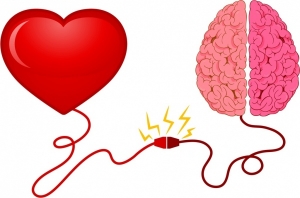
Vascular (heart) health is intrinsically linked to cerebrovascular (brain) health. With each heartbeat, arteries carry between 20 to 25% of your blood to your brain, where billions of cells use about 20% of the oxygen and fuel carried in your blood. As the brain needs a significant proportion of your blood supply to maintain normal function, looking after our blood vessels is vitally important. Vascular health factors, including hypertension (high blood pressure) and obesity play a major role in dementia risk. Obesity increases our risk for other chronic conditions and diseases, such as strokes and heart failure. What we know is that people who have strokes, heart failure or heart attacks are at an increased risk of developing dementia. The relationship between body weight and dementia is quite complicated. As people develop dementia in older age, they tend to lost weight. This is probably because the brain is telling them not to eat as much, but more research is needed to further examine why this happens. At mid-life however, obesity is associated with future risk of dementia. Additionally, people with a very large waist circumference tend to have a higher risk of dementia. Fat deposits around the waist can be the source of inflammation and this directly affects the health of blood vessels and brain health. You have probably heard of Vascular Dementia. It can be caused by the accumulated effect of small and large strokes on the brain, that finally result in the degeneration of nerve cells and their connection. Vascular pathology can also increase risk of other conditions that cause dementia, such as Alzheimer’s disease. But for those of us who have had strokes or heart attacks, it is still not too late to make a difference to your risk of developing dementia in the future. Researchers have found that whilst one stroke by itself may not increase the risk of dementia too much, more than one will increase risk further. So, it’s important to work with health professionals and reduce the risk of further strokes. The same applies to heart attacks; if you have the risk factors for heart disease, such as high blood pressure, poor diet, overweight, smoking or diabetes, managing these will reduce the risk of heart damage and failure, and also reduce the risk for dementia. Keeping our weight within a healthy range will assist in reducing the risk of developing heart disease, strokes, hypertension and dementia. Being physically active and having a healthy diet that's kind to your heart, arteries and blood vessels, will help maintain a healthy body weight and a healthy brain.
|